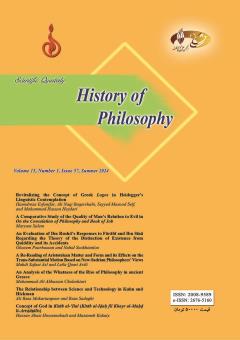Revitalizing the Concept of Greek Logos in Heidegger’s Linguistic Contemplation
Subject Areas : Geneology of philosophical schools and Ideas
Hamidreza Erfanifar
1
![]() ,
Ali Naghi Baghershahi
2
,
Ali Naghi Baghershahi
2
![]() ,
Seyyed Masood Seif
3
,
Seyyed Masood Seif
3
![]() ,
Mohammad Hasan Heidari
4
,
Mohammad Hasan Heidari
4
![]()
1 - PhD Candidate of Western Contemporary Philosophy, Imam Khomeini International University, Qazvin, Iran
2 - Associate Professor, Philosophy Department, Imam Khomeini International University, Qazvin, Iran
3 - Associate Professor, Philosophy Department, Imam Khomeini International University, Qazvin, Iran
4 - Assistant Professor, Philosophy Department, Imam Khomeini International University, Qazvin, Iran
Keywords: Logos, language, Existence, Heraclitus, Heidegger,
Abstract :
The concept of Logos has undergone a complicated process of development. This term was used for the first time by pre-Socratic philosophers as a fundamental concept in relation to the universal and regulative intellect. Heraclitus granted Logos an original status in philosophy. After him, some other philosophers used this term in different meanings and functions in Greek. In Christianity, Logos turned into a divine power and Christ himself. In the contemporary era, Heidegger used this concept in order to explain his perception of language and its relation to Dasein. In this paper, the authors aim to propound and investigate the meanings and concepts that the Greek tried to express using the term Logos based on available evidence in the history of philosophy in ancient Greece. Next, they analyze Heidegger’s standpoint on this old concept and his interpretation and use of Logos in revealing his intentions in terms of linguistic ontology. After comparing the Greeks’ ideas of Logos and Heidegger’s understanding of this term, they conclude that Heidegger chooses Logos because it allows things to be seen. This is because in his view language is not only a tool for communication but also a revealer of the truth of existents. Therefore, he has paid greater attention to this aspect of Logos.
ارسطو (1399) مابعدالطبيعه (متافيزيک)، ترجمۀ محمدحسن لطفی، تهران: طرح نو.
افلاطون (1366الف) میهمانی، در دوره آثار افلاطون، ترجمۀ محمدحسن لطفی و رضا کاویانی، تهران: خوارزمی.
افلاطون (1366ب) منون، در دوره آثار افلاطون، ترجمۀ محمدحسن لطفی و رضا کاویانی، تهران: خوارزمی.
افلاطون (1366ج) تهئهتتوس، در دوره آثار افلاطون، ترجمۀ محمدحسن لطفی و رضا کاویانی، تهران: خوارزمی.
افلاطون (1366د) مرد سیاسی، در دوره آثار افلاطون، ترجمۀ محمدحسن لطفی و رضا کاویانی، تهران: خوارزمی.
افلاطون (1366هـ) سوفیست، در دوره آثار افلاطون، ترجمۀ محمدحسن لطفی و رضا کاویانی، تهران: خوارزمی.
گاتری، دبلیو. کی. سی. (1376) تاریخ فلسفه یونان، ترجمۀ مهدی قوام صفری، تهران: فکر روز.
هایدگر، مارتین (1386) هستی و زمان، ترجمۀ سیاوش جمادی، تهران: ققنوس.
هایدگر، مارتین (1388) چه باشد آنچه خوانندش تفکر، ترجمۀ سیاوش جمادی، تهران: ققنوس.
Aler, J., (1997). The Conception of Language in Being and Time. in Martin Heidegger: Critical Assessments, Volume III: Language. London: Routledge.
Aristotle (2009). Nicomachean Ethics. trans. By D. Ross, Oxford: Oxford University Press.
Friis, L. (1912). The Logos And The Philosophers. The Word. The Word 15: 374–376.
Heidegger, M. (1959). Logos (Heraklit Fragment 50). in Vorträge und Aufsätze. Neske
Heidegger, M. (1962). Being and Time. trans. by J. Macquarrie and E. Robinson. New York: Harper.
Heidegger, M. (1976). Early Greek Thinking. trans. by D. F. Krell & F. A. Capuzzi. New York: Harper & Row.
Heidegger, M. (1987). An Introduction to Metaphysics. trans. by R. Manheim. New Haven: Yale University Press.
Heidegger, M. (1992). History of the Concept of Time: Prolegomena. trans. by T. Kisiel. Indianapolis: Indiana University Press.
Inge, W. R. (1916). Logos. Encyclopedia of Religion and Ethics. Ed. by J. Hastings. Vol. 8: Life And Death; Mulla. Edinburgh: T. & T. Clark.
Liddell, H. G. & Scott, R. (1897). A Greek-English Lexicon. 8th ed. Oxford: Clarendon Press.
Luering, H. L. E. (1915). Logos. The International Standard Bible Encyclopedia. Vol. 3. Chicago: Howard-Severance Company.
Richardson, W. J. (1974). Heidegger: Through Phenomenology to Thought. Netherlands: the Hague.
Schalow, F. (2019). Historical Dictionary of Heidegger’s Philosophy. Rowman & Littlefield
Vycinas, V. (1961). Earth and Gods: an Introduction to the Philosophy of Martin Heidegger . Martinus Nijhoff
Wrathall, M. A. (2011). Heidegger and Unconcealment: Truth, Language, and History. New York: Cambridge University Press.


